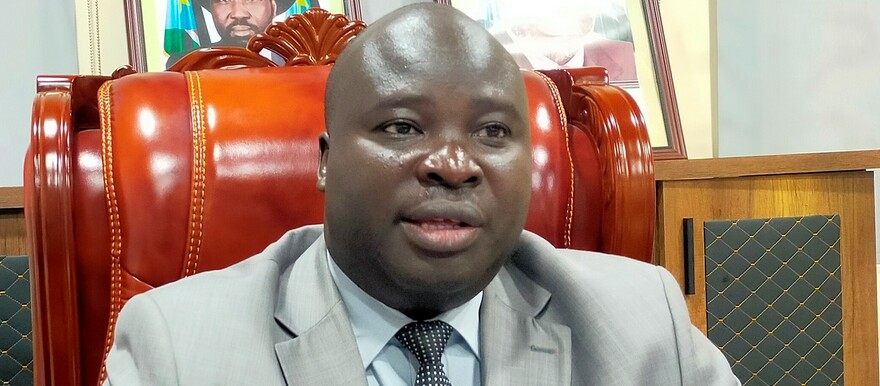South Sudan’s First Deputy Speaker Oyet Nathaniel said he was blocked from leaving the country by the National Security Service at Juba Airport, days after the extension of the transitional period for two years.
Oyet Nathaniel Pierino told Radio Tamazuj Wednesday that he was turned away from the airport this morning by security officers, who were under instructions not to let him leave the country.
He pointed out that the Director General of the Internal Security Bureau of the National Security Service (NSS), Gen. Akol Koor Kuc, prevented him from travelling abroad despite approval of his travel by Speaker Jemma Nunu Kumba.
“Yesterday, I received an emergency call from my family; I discussed it with the Speaker, and the Speaker granted me a leave of absence, so I sent the protocol to the airport. From the airport, the protocol was told that even after checking in my bags at the counter, now the last check-in to go to the lounge for departure, a security officer at the counter said we cannot approve if it was the Deputy Speaker because we have received instruction from the Director General of the National Security Service,” said Oyet.
“I said you give the phone to the security officer at the counter, but he refused to talk. Instead, he was seen calling somebody I think could be the Director General of the National Security, Gen. Akol Koor. So, he did not approve, and the plane even left my bags on the runway,” he added.
Oyet, who is also the Deputy Chairman of the opposition SPLM-IO led by First Vice President Riek Machar, decried the lack of freedom of movement in the country.
“There is no freedom of movement here, political space, or civil liberty. You can be arrested anytime using the unfitted powers of the National Security Service, and the one sanctioning this is the DG of the National Security. I will insist on travel; I cannot be detained unless they tell me I am detained. If I am not under detention, I will still go to the airport tomorrow and travel, and if I come back, I will commence consultation with all the parliamentarians and will table a motion against the National Security,” he stressed.
“This is politically motivated because even the First Vice President is being hindered from travelling. They have now come to me, and I will not tolerate it.”
Government spokesperson Michael Makuei could not immediately reach out for comments.
Reacting to blocking of the first deputy speaker from leaving the country, Civil Society Activist Ter Manyang Gatwech said preventing the First Deputy Speaker from travelling did not come as a surprise.
“It has not come as a surprise to me because when the parliamentarians were busy passing the National Security Bill, they thought this was only for the ordinary citizens, journalists and activists. For us to build the trust and political will, the National Security Service is not supposed to interfere with the key government officials who are part of the implementation of the peace agreement,” said Manyang.
“After what happened, this is a serious indication that the National Security is holding this country back due to this restriction policy. Even our constitution, the Transitional Constitution of South Sudan as amended Article 25, gives us the freedom of expression, participation and Article 24 talks of the freedom of association and movement, so if the same National Security cannot allow key government officials to move then the country is not moving in the right direction,” he concluded.
South Sudan’s National Legislative Assembly on July 3, 2024, amended the law governing the National Security Service (NSS), in ways that will further entrench the agency’s longstanding abuses.
Parliament passed amendments to the 2014 National Security Service Act after a four-hour debate by a vote of 274-114 that will allow the agency to continue arresting or detaining people without a warrant.




